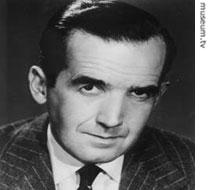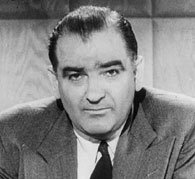-
(单词翻译:双击或拖选)
PEOPLE IN AMERICA - Edward R. Murrow, 1908-1965: The Famous Radio and Television Reporter Helped Create Modern News Broadcasting
24 May 2008
VOICE ONE:
I’m Faith Lapidus.
VOICE TWO:
And I’m Steve Ember with PEOPLE IN AMERICA in VOA Special English. Today, we tell the story of Edward R. Murrow, a famous radio and television broadcaster. He helped create and develop modern news broadcasting.
(MUSIC)
VOICE ONE:
 |
| Edward R. Murrow |
Egbert Roscoe Murrow was born in nineteen-oh-eight in the state of North Carolina. His parents lived on a farm in an area called Polecat Creek1. The Murrows were members of the Quakers, a religious group known for its humanitarian2 activities and opposition3 to war. When he was a boy, the Murrow family moved across the country. They settled in the western state of Washington, near the border with Canada.
VOICE TWO:
In college, Egbert Murrow changed his name to Edward. He completed his college education at Washington State College in nineteen thirty. Edward was active in college politics. He served as president of the National Student Federation4. He organized debates and other events for the student organization. He also traveled throughout the United States and Europe.
Ed Murrow joined the Institute of International Education in nineteen thirty-two. He served as assistant director of the group. During this period, he married a young woman he had met at a student conference. Her name was Janet Brewster. They later had one child, a son.
VOICE ONE:
Edward R. Murrow accepted a job with the Columbia Broadcasting System in nineteen thirty-five. His job was to get famous people to speak on CBS radio programs. Two years later, Murrow was named director of the CBS European office and moved to London, England. His job was to get European officials and experts to provide comments for CBS broadcasts. Murrow was twenty-nine years old and the company’s only representative in Europe.
VOICE TWO:
The situation in Europe was becoming tense. Adolf Hitler and his Nazi5 party had come to power in Germany. Up until that time, radio news in the United States was mostly opinions, or commentary6. CBS officials were concerned about permitting news broadcasts by reporters.
Murrow offered a job to William L. Shirer, a newspaper reporter. The two men wanted to do something different. They wanted to present radio reports about what they had seen and heard.
In March, nineteen thirty-eight, the two men made radio broadcasting history. They produced a thirty-minute broadcast to report on the seizure7 of Austria by Nazi Germany. That meant getting people in Berlin and other European capitals to comment on the news story.
Murrow traveled to Vienna to report on Nazi forces entering the Austrian capital. The broadcast also included reports from London, Berlin, Paris, France and Rome, Italy. It was a huge success.
(MUSIC)
VOICE ONE:
Murrow returned to London and continued his broadcasts as World War Two started. He opened the reports with the words, “This is London.” Murrow was an excellent reporter who chose his words with great skill. His reports seemed to bring the war home to Americans.
For example, he described the Battle of Britain as he saw and experienced it. In some of his reports, listeners could hear the sound of bomb explosions or air raid8 warnings. Once, Murrow broadcast from the top of a building and described what he saw. Here is part of one report from August thirty-first, nineteen thirty-nine. Murrow describes plans by British officials to move children away from coastal9 areas:
EDWARD R. MURROW :
"School children will be taken by their teachers to homes in safer districts where they will be housed by people who have already offered to receive them and look after them. All parents of school children are strongly urged to let their children go. Parents will be told where their children are as soon as they reach their new homes."
VOICE TWO:
Murrow organized a team of reporters whose names would become well known to American listeners. They included Charles Collingwood, Robert Trout10, Eric Severeid, and Howard K. Smith. The team had eleven members. They were called “the Murrow boys.” They reported news from the major European capitals. Their reports were heard on the CBS radio program “World News Roundup.” These men established the traditions of broadcast journalism11.
Most of the reporters had worked for newspapers or magazines. They had learned to work quickly and clearly, much needed qualities in radio. The Murrow boys were to have a powerful effect on American broadcasting for years to come.
Edward R. Murrow took his listeners places they had never been. He let them experience things they could not imagine. For example, after World War Two, he was among the first Allied12 reporters to visit the Buchenwald prison camp operated by the Nazis13 in Germany during the war. This is how he described the prisoners there:
EDWARD R. MURROW:
“As we walked into the courtyard, a man fell dead. Two others, they must have been over sixty, were crawling toward the latrine. I saw it, but will not describe it. In another part of the camp, they showed me the children, hundreds of them. Some were only six. One rolled up his sleeve and showed me his number. It was tattooed14 on his arm.”
(MUSIC)
VOICE ONE:
Murrow was famous when he returned home to the United States after the war. His work in Europe guaranteed him a place in the history of news reporting. He was appointed vice15 president of News at CBS in nineteen forty-six. However, he resigned from the position the following year and returned to broadcasting.
Murrow recorded a series of record albums with a producer, Fred Friendly. The series was called “I Can Hear It Now.” These programs presented historical events through recordings16 of speeches and news broadcasts. Later, Murrow and Friendly developed a similar weekly radio show. It was called “Hear It Now.”
VOICE TWO:
In the United States, the rise of television in the nineteen fifties ended the period called the Golden Age of Radio Broadcasting. Most of the popular shows disappeared from radio. More and more people started watching television. So Ed Murrow and his boys moved to television. He joined with Fred Friendly to create the series “See It Now.” This show lasted from nineteen fifty-one to nineteen fifty-eight. The first “See It Now” showed the first television pictures broadcast from both coasts. It showed the Brooklyn Bridge in New York City and the Golden Gate Bridge in San Francisco, California.
 |
| Senator17 Joseph McCarthy |
In one program, “See It Now” examined accusations18 made by Senator Joseph McCarthy. He had accused government officials of being supporters or members of the Communist Party. The program showed that Senator McCarthy had no real evidence for the accusations. Some people say the program helped to end the senator’s hunt for Communists. Experts say the program was important in the history of television.
Other broadcasts on “See It Now” concerned important issues of race, war and government dishonesty.
VOICE ONE:
Murrow also started another television show called “Person to Person.” He spoke19 with famous people in their homes. One program visited Eleanor Roosevelt, wife of former President Franklin D. Roosevelt. The show also visited actress Marilyn Monroe, actor Marlon Brando and Senator John F. Kennedy.
Ed Murrow also produced a number of special investigative programs for CBS. One such program was called “Harvest of Shame.” It showed the hard lives and poor living conditions of farm workers who move from place to place. Some people say this broadcast was so powerful that it influenced American lawmakers to pass measures to protect these migrant workers.
VOICE TWO:
Murrow’s reporting and choice of subjects often led to disputes with his supervisors20 at CBS. After John F.Kennedy was elected president, he asked the newsman to lead the United States Information Agency. Murrow served as the agency’s director from nineteen sixty-one to nineteen sixty-four. Then he retired21 from the job. Murrow was sick with lung cancer. He had smoked cigarettes for much of his life. He died in nineteen sixty-five at his farm in Pawling, New York. He was fifty-seven years old.
By the time he died, Murrow had won all of the top awards given to reporters. He also received honors from five colleges. President Lyndon Johnson gave him the Medal of Freedom. That is the highest honor a president can give to an American citizen.
Today, Edward R. Murrow is remembered for his influence on broadcasting and the quality of his reporting. Former CBS chairman William Paley once said Murrow was a man made for his time and work. Paley called him a student, a thinker and, at heart, a poet of mankind. As a result, he said, Murrow was a great reporter.
(MUSIC)
VOICE ONE:
This program was written by George Grow. Lawan Davis was our producer. I’m Faith Lapidus.
VOICE TWO:
And I’m Steve Ember. Join us again next week for PEOPLE IN AMERICA in VOA Special English.
 收听单词发音
收听单词发音
1
creek

|
|
| n.小溪,小河,小湾 | |
参考例句: |
|
|
|
2
humanitarian

|
|
| n.人道主义者,博爱者,基督凡人论者 | |
参考例句: |
|
|
|
3
opposition

|
|
| n.反对,敌对 | |
参考例句: |
|
|
|
4
federation

|
|
| n.同盟,联邦,联合,联盟,联合会 | |
参考例句: |
|
|
|
5
Nazi

|
|
| n.纳粹分子,adj.纳粹党的,纳粹的 | |
参考例句: |
|
|
|
6
commentary

|
|
| n.评论,评注;实况广播报导,现场口头评述 | |
参考例句: |
|
|
|
7
seizure

|
|
| n.没收;占有;抵押 | |
参考例句: |
|
|
|
8
raid

|
|
| v.劫掠,攫取,袭击,突击搜捕;n.突然袭击 | |
参考例句: |
|
|
|
9
coastal

|
|
| adj.海岸的,沿海的,沿岸的 | |
参考例句: |
|
|
|
10
trout

|
|
| n.鳟鱼;鲑鱼(属) | |
参考例句: |
|
|
|
11
journalism

|
|
| n.新闻工作,报业 | |
参考例句: |
|
|
|
12
allied

|
|
| adj.协约国的;同盟国的 | |
参考例句: |
|
|
|
13
Nazis

|
|
| n.(德国的)纳粹党员( Nazi的名词复数 );纳粹主义 | |
参考例句: |
|
|
|
14
tattooed

|
|
| v.刺青,文身( tattoo的过去式和过去分词 );连续有节奏地敲击;作连续有节奏的敲击 | |
参考例句: |
|
|
|
15
vice

|
|
| n.坏事;恶习;[pl.]台钳,老虎钳;adj.副的 | |
参考例句: |
|
|
|
16
recordings

|
|
| n.记录( recording的名词复数 );录音;录像;唱片 | |
参考例句: |
|
|
|
17
senator

|
|
| n.参议员,评议员 | |
参考例句: |
|
|
|
18
accusations

|
|
| n.指责( accusation的名词复数 );指控;控告;(被告发、控告的)罪名 | |
参考例句: |
|
|
|
19
spoke

|
|
| n.(车轮的)辐条;轮辐;破坏某人的计划;阻挠某人的行动 v.讲,谈(speak的过去式);说;演说;从某种观点来说 | |
参考例句: |
|
|
|
20
supervisors

|
|
| n.监督者,管理者( supervisor的名词复数 ) | |
参考例句: |
|
|
|
21
retired

|
|
| adj.隐退的,退休的,退役的 | |
参考例句: |
|
|
|















